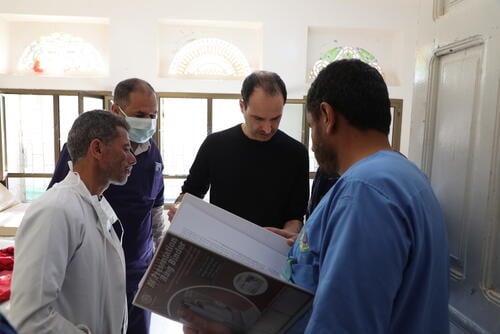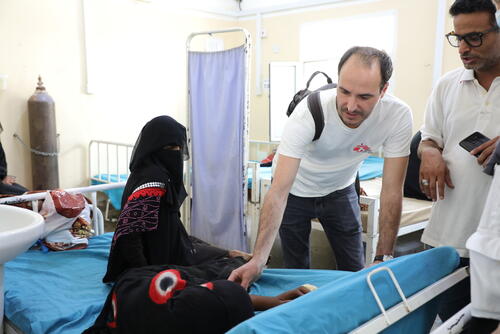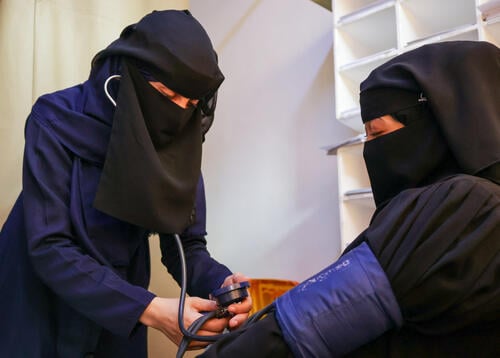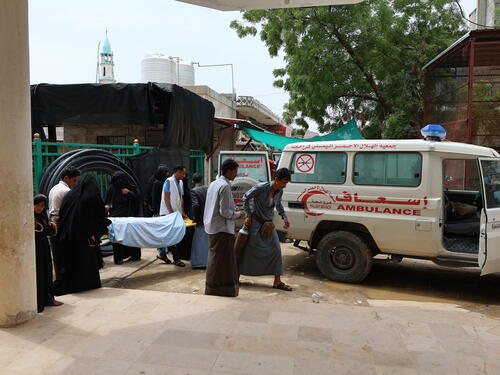After a recent trip to Yemen, Médecins Sans Frontières (MSF) International President, Dr Christos Christou, reflects on the dire humanitarian crisis faced by people in Yemen after almost eight years of war, and calls for more assistance to respond to people’s most immediate needs.
Since the onset of war in Yemen approximately eight years ago, tens of thousands of people have been killed or injured, and more than four million have been displaced.
While the fighting itself has decreased following last year’s ceasefire, it’s left in its wake a worsening health and humanitarian crisis; there are shortages of medical supplies and staff, basic healthcare is often too expensive for people to access amid a collapsed economy. Malnutrition rates were alarmingly high last year, and a lack of access to routine vaccination has led to outbreaks of preventable diseases like measles, tetanus, and diphtheria. People’s needs are intersecting here in a way that forms a perfect storm.

During my recent visit to Yemen, my colleagues at Al-Jamhouri Authority Hospital in Hajjah, the capital city of Hajjah governorate in northwest Yemen, had plenty of stories to share with me about the people we treat for trauma - both physical and mental. They talked to me about a 48-year-old father of four who isolated himself after losing his ability to work and support his family. Given the poor economy and collapse of currency, his job loss left him with extreme fear and anxiety.
A colleague told me: “[He] started to question everyone around him. He couldn’t trust anyone, withdrawing gradually from life. It was a long and heavy process to treat his acute mental symptoms and to stabilise his feelings.
“Then eventually he became functional again and found a job to support his family. Our teams run a holistic mental health programme that includes psycho-education group sessions, next to psychological care and psychiatric treatment for severe mental health disorders. Through this, we helped him take back his life.”
I cannot imagine how people in labor or in need of urgent care manage this arduous journey and the barriers they must overcome just to access healthcare.Dr Christos Christou, MSF international president
I left this hospital and the high mountains of northern Yemen with pride for what MSF can do - here and in the 27 other health facilities that we run and support across the country.
As I travelled by road during my visit, I gained a better sense of some of the challenges faced by Yemenis seeking medical care, including having to take long journeys because there aren’t affordable health facilities closer to their homes - if there are any facilities at all.
I cannot imagine how people in labor or in need of urgent care manage this arduous journey and the barriers they must overcome just to access healthcare. One of these people is a woman I met who had to travel for six hours across southwestern Yemen from Mocha all the way to Taiz city in Taiz governorate to have an emergency caesarean section in Al-Jamhouri hospital for her firstborn child, a healthy baby girl.
But even for children like this who are born healthy, malnutrition is a threat that constantly lurks in the shadows. Between January and October 2022, more than 7,500 children with malnutrition came to MSF-supported facilities - an increase of more than a third compared to the same period in 2021.
These high rates of malnutrition in children under five have overwhelmed hospitals like Khamir hospital in Amran governorate in the north. This was especially evident in the inpatient therapeutic feeding centre as I saw that it was full of children suffering from malnutrition, including severe cases with complications. Many of these cases could have been prevented if mothers had support during their pregnancies and children had access to affordable, nutritious food and timely healthcare services.

Further fueling a struggle for children in Yemen is a surge in measles cases because of critical gaps in routine vaccination and low vaccination rates, as well as the fact that many people are living in displacement camps where diseases can easily spread. Vaccines play a key role in preventing kids from getting sick in the first place, which is critical in countries like Yemen where accessing basic healthcare is difficult if they fall ill.
But patients are not the only ones who face challenges in Yemen. My colleagues often face bureaucratic barriers like movement restrictions. Delayed imports of much-needed supplies, the rejection of staff visas to enter the country and permits they need to travel inside the country. The looming threat of attacks on hospitals also hamper our efforts to provide humanitarian aid. It's critical that staff working in the healthcare system should be exempt from any kind of restrictions that interfere with the safe and timely delivery of medical services.
Yet, even among challenges and threats like these, many people I met in Yemen who have suffered so much remain hopeful that their lives will go back to how they were before the war. We continue to stand in solidarity with people living and working in this humanitarian crisis, but it’s clear that more aid is urgently needed to truly regain a semblance of normalcy.
Any assistance that’s provided should be sustained and improved to respond to people’s most immediate needs. While Yemen receives intermittent international attention, it must remain a priority on donors’ international development and humanitarian agendas.






